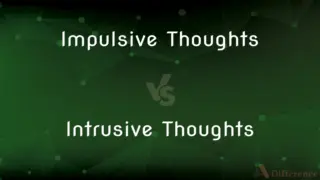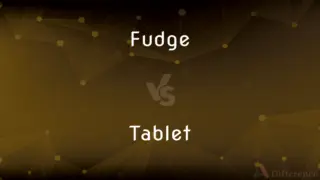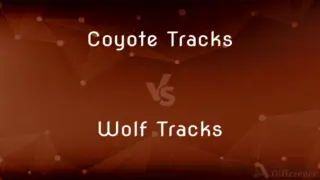Trail vs. Trace — What's the Difference?
By Maham Liaqat & Fiza Rafique — Updated on March 22, 2024
A trail is a path or track, while a trace is a small amount or indication of something.

Difference Between Trail and Trace
Table of Contents
ADVERTISEMENT
Key Differences
Trails are often associated with paths made through natural areas by the passage of people or animals, used for walking, hiking, or biking. They are physical routes that can be followed. In contrast, traces refer to tiny or barely detectable amounts of a substance or element, or to signs that something has been present or occurred. For example, detectives might find traces of DNA at a crime scene, indicating someone's presence.
The concept of a trail also extends to the idea of following behind something or someone, as in "trailing behind in a race." Traces, however, are more about the remnants or hints left behind that something exists or happened, like the trace of a scent in a room.
Trails can be maintained and marked paths in parks or wilderness areas, serving as guides for exploration or travel. Traces, in scientific contexts, often refer to minute quantities that are detectable by tests or specialized equipment, like trace elements in water.
The usage of "trail" can imply a physical journey or movement, with connotations of exploration or following. "Trace," on the other hand, suggests investigation or the process of discovering evidence of something's existence, often requiring careful observation or analysis.
In literature and speech, "trail" can evoke images of adventure, nature, and paths to be followed or blazed. "Trace," however, often introduces an element of mystery or the need to search for something hidden or minimal, emphasizing the investigative or deductive process.
ADVERTISEMENT
Comparison Chart
Definition
A path or track made by the passage of people or animals
A small amount or indication of something
Common Usage
Walking, hiking, biking paths
Minute quantities or signs of presence
Context
Physical movement, exploration
Investigation, detection of remnants
Connotations
Exploration, following
Investigation, minimal presence
Examples
Nature trails, bike trails
Traces of DNA, trace elements in substances
Compare with Definitions
Trail
A path through a natural area created by the passage of people or animals.
The forest trail led hikers through a dense canopy of trees.
Trace
A very small amount or indication of something's presence.
The chemist found a trace of the substance in the sample.
Trail
The act of following behind someone or something.
The detective trailed the suspect through the city streets.
Trace
In scientific terms, refers to minute quantities detectable by tests.
Trace elements are essential for the body, even in tiny amounts.
Trail
A marked route for recreational use.
The national park features several scenic trails for visitors.
Trace
The act of finding or discovering something through investigation.
Archaeologists can trace the history of ancient civilizations through artifacts.
Trail
In a figurative sense, can refer to a series of events or a line of thought.
The documentary followed the trail of historical events leading up to the revolution.
Trace
Can imply a subtle sign or evidence of something.
There was a trace of sadness in her voice.
Trail
Can imply a journey or exploration.
They set off on a trail that took them across several countries.
Trace
Used to describe the action of outlining or copying something.
The artist traced the outline of the landscape onto his canvas.
Trail
A trail is usually a path, track or unpaved lane or road. In the United Kingdom and the Republic of Ireland, path or footpath is the preferred term for a walking trail.
Trace
Find or discover by investigation
Police are trying to trace a white van seen in the area
Trail
To allow to drag or stream behind, as along the ground
The dog ran off, trailing its leash.
Trace
Copy (a drawing, map, or design) by drawing over its lines on a superimposed piece of transparent paper
Trace a map of the world on to a large piece of paper
Trail
To drag (the body, for example) wearily or heavily.
Trace
A mark, object, or other indication of the existence or passing of something
Remove all traces of the old adhesive
The aircraft disappeared without trace
Trail
To follow the traces or scent of, as in hunting; track.
Trace
A very small quantity, especially one too small to be accurately measured
His body contained traces of amphetamines
Trace quantities of PCBs
Trail
To follow the course taken by; pursue
Trail a fugitive.
Trace
A procedure to investigate the source of something, such as the place from which a telephone call was made
We've got a trace on the call
Trail
To follow behind
Several cruisers trailed by an escorting destroyer.
Trace
A line which represents the projection of a curve or surface on a plane or the intersection of a curve or surface with a plane.
Trail
To lag behind (an opponent)
Trailed the league leader by four games.
Trace
A path or track.
Trail
To drag or be dragged along, brushing the ground
The queen's long robe trailed behind.
Trace
The sum of the elements in the principal diagonal of a square matrix.
Trail
To extend, grow, or droop loosely over a surface
Vines trailing through the garden.
Trace
Each of the two side straps, chains, or ropes by which a horse is attached to a vehicle that it is pulling.
Trail
To drift in a thin stream
Smoke trailing from a dying fire.
Trace
A visible mark, such as a footprint, made or left by the passage of a person, animal, or thing.
Trail
To become gradually fainter; dwindle
His voice trailed off in confusion.
Trace
Evidence or an indication of the former presence or existence of something; a vestige
Left without a trace of having been there.
Trail
To walk or proceed with dragging steps; trudge
Trailed along in glum silence.
Trace
An extremely small amount or barely perceivable indication
Spoke with a trace of sarcasm.
Trail
To be behind in competition; lag
Trailing by two goals in the second period.
Trace
A constituent, such as a chemical compound or element, present in quantities less than a standard limit.
Trail
A marked or beaten path, as through woods or wilderness.
Trace
A path or trail that has been beaten out by the passage of animals or people.
Trail
An overland route
The pioneers' trail across the prairies.
Trace
An act of researching or ascertaining the origin or location of something
Put a trace on the phone call.
Asked for a trace on a lost package.
Trail
A marked course through one or more bodies of water, as for recreational boaters or divers.
Trace
A line drawn by a recording instrument, such as a cardiograph.
Trail
A mark, trace, course, or path left by a moving body.
Trace
The point at which a line, or the curve in which a surface, intersects a coordinate plane.
Trail
The scent of a person or animal
The dogs lost the trail of the fox.
Trace
The sum of the elements of the principal diagonal of a matrix.
Trail
Something that is drawn along or follows behind; a train
The mayor was followed by a trail of reporters.
Trace
An engram.
Trail
A succession of things that come afterward or are left behind
Left a trail of broken promises.
Trace
One of two side straps or chains connecting a harnessed draft animal to a vehicle or whiffletree.
Trail
Something that hangs loose and long
Trails of ticker tape floated down from office windows.
Trace
A bar or rod, hinged at either end to another part, that transfers movement from one part of a machine to another.
Trail
The part of a gun carriage that rests or slides on the ground.
Trace
To go along or follow (a path, for example)
We traced the trail up the mountain.
Trail
The act of trailing.
Trace
To follow the course or trail of
Trace a wounded deer.
Trail
(transitive) To follow behind (someone or something); to tail (someone or something).
The hunters trailed their prey deep into the woods.
Trace
To ascertain the successive stages in the development or progress of
Tracing the life cycle of an insect.
Trace the history of a family.
Trail
(transitive) To drag (something) behind on the ground.
You'll get your coat all muddy if you trail it around like that.
Trace
To discover or determine by searching or researching evidence
Trace the cause of a disease.
Trail
(transitive) To leave (a trail of).
He walked into the house, soaking wet, and trailed water all over the place.
Trace
To locate or ascertain the origin of
Traced the money to a foreign bank account.
Trail
(transitive) To show a trailer of (a film, TV show etc.); to release or publish a preview of (a report etc.) in advance of the full publication.
His new film was trailed on TV last night.
There were no surprises in this morning's much-trailed budget statement.
Trace
To draw (a line or figure); sketch; delineate.
Trail
(intransitive) To hang or drag loosely behind; to move with a slow sweeping motion.
The bride's long dress trailed behind her as she walked down the aisle.
Trace
To form (letters) with special concentration or care.
Trail
(intransitive) To run or climb like certain plants.
Trace
To copy by following lines seen through a sheet of transparent paper.
Trail
(intransitive) To drag oneself lazily or reluctantly along.
Our parents marched to church and we trailed behind.
Trace
To follow closely (a prescribed pattern)
The skater traced a figure eight.
Trail
To be losing, to be behind in a competition.
Trace
To imprint (a design) by pressure with an instrument on a superimposed pattern.
Trail
(military) To carry (a firearm) with the breech near the ground and the upper part inclined forward, the piece being held by the right hand near the middle.
Trace
To make a design or series of markings on (a surface) by such pressure on a pattern.
Trail
To create a trail in.
Trace
To record (a variable), as on a graph.
Trail
To travel by following or creating trails.
Trace
To make one's way along a trail or course
We traced along the ridge.
Trail
To transport (livestock) by herding it along a trail.
Trace
To have origins; be traceable
Linguistic features that trace to West Africa.
Trail
(dated) To take advantage of the ignorance of; to impose upon.
Trace
Occurring in extremely small amounts or in quantities less than a standard limit.
Trail
A route for travel over land, especially a narrow, unpaved pathway for use by hikers, horseback riders, etc.
Trace
An act of tracing.
Your cell phone company can put a trace on your line.
Trail
A route or circuit generally.
Politicians are on the campaign trail in preparation for this year's election.
Trace
An enquiry sent out for a missing article, such as a letter or an express package.
Trail
(television) A trailer broadcast on television for a forthcoming film or programme.
Trace
A mark left as a sign of passage of a person or animal.
Trail
(graph theory) A walk in which all the edges are distinct.
Trace
A residue of some substance or material.
There are traces of chocolate around your lips.
Trail
The horizontal distance from where the wheel touches the ground to where the steering axis intersects the ground.
Trace
A very small amount.
All of our chocolates may contain traces of nuts.
Trail
To hunt by the track; to track.
Trace
(electronics) A current-carrying conductive pathway on a printed circuit board.
Trail
To draw or drag, as along the ground.
And hung his head, and trailed his legs along.
They shall not trail me through their streetsLike a wild beast.
Long behind he trails his pompous robe.
Trace
An informal road or prominent path in an arid area.
Trail
To carry, as a firearm, with the breech near the ground and the upper part inclined forward, the piece being held by the right hand near the middle.
Trace
One of two straps, chains, or ropes of a harness, extending from the collar or breastplate to a whippletree attached to a vehicle or thing to be drawn; a tug.
Trail
To tread down, as grass, by walking through it; to lay flat.
Trace
(engineering) A connecting bar or rod, pivoted at each end to the end of another piece, for transmitting motion, especially from one plane to another; specifically, such a piece in an organ stop action to transmit motion from the trundle to the lever actuating the stop slider.
Trail
To take advantage of the ignorance of; to impose upon.
I presently perceived she was (what is vernacularly termed) trailing Mrs. Dent; that is, playing on her ignorance.
Trace
(fortification) The ground plan of a work or works.
Trail
To grow to great length, especially when slender and creeping upon the ground, as a plant; to run or climb.
Trace
(geometry) The intersection of a plane of projection, or an original plane, with a coordinate plane.
Trail
A track left by man or beast; a track followed by the hunter; a scent on the ground by the animal pursued; as, a deer trail.
They traveled in the bed of the brook, leaving no dangerous trail.
How cheerfully on the false trail they cry!
Trace
(mathematics) The sum of the diagonal elements of a square matrix.
Trail
A footpath or road track through a wilderness or wild region; as, an Indian trail over the plains.
Trace
(grammar) An empty category occupying a position in the syntactic structure from which something has been moved, used to explain constructions such as wh-movement and the passive.
Trail
Anything drawn out to a length; as, the trail of a meteor; a trail of smoke.
When lightning shoots in glittering trails along.
Trace
(transitive) To follow the trail of.
Trail
Anything drawn behind in long undulations; a train.
Trace
To follow the history of.
Trail
Anything drawn along, as a vehicle.
Trace
(transitive) To draw or sketch lightly or with care.
He carefully traced the outlines of the old building before him.
Trail
A frame for trailing plants; a trellis.
Trace
(transitive) To copy onto a sheet of paper superimposed over the original, by drawing over its lines.
Trail
The entrails of a fowl, especially of game, as the woodcock, and the like; - applied also, sometimes, to the entrails of sheep.
The woodcock is a favorite with epicures, and served with its trail in, is a delicious dish.
Trace
To copy; to imitate.
Trail
That part of the stock of a gun carriage which rests on the ground when the piece is unlimbered. See Illust. of Gun carriage, under Gun.
Trace
To walk; to go; to travel.
Trail
The act of taking advantage of the ignorance of a person; an imposition.
Trace
To walk over; to pass through; to traverse.
Trail
A path or track roughly blazed through wild or hilly country
Trace
To follow the execution of the program by making it to stop after every instruction, or by making it print a message after every step.
Trail
Evidence pointing to a possible solution;
The police are following a promising lead
The trail led straight to the perpetrator
Trace
One of two straps, chains, or ropes of a harness, extending from the collar or breastplate to a whiffletree attached to a vehicle or thing to be drawn; a tug.
Trail
To lag or linger behind;
But in so many other areas we still are dragging
Trace
A connecting bar or rod, pivoted at each end to the end of another piece, for transmitting motion, esp. from one plane to another; specif., such a piece in an organ-stop action to transmit motion from the trundle to the lever actuating the stop slider.
Trail
Go after with the intent to catch;
The policeman chased the mugger down the alley
The dog chased the rabbit
Trace
A mark left by anything passing; a track; a path; a course; a footprint; a vestige; as, the trace of a carriage or sled; the trace of a deer; a sinuous trace.
Trail
Move, proceed, or walk draggingly pr slowly;
John trailed behind behis class mates
The Mercedes trailed behind the horse cart
Trace
A very small quantity of an element or compound in a given substance, especially when so small that the amount is not quantitatively determined in an analysis; - hence, in stating an analysis, often contracted to tr.
Trail
Hang down so as to drag along the ground;
The bride's veiled trailed along the ground
Trace
The intersection of a plane of projection, or an original plane, with a coordinate plane.
Trail
Drag loosely along a surface; allow to sweep the ground;
The toddler was trailing his pants
She trained her long scarf behind her
Trace
The ground plan of a work or works.
Trace
To mark out; to draw or delineate with marks; especially, to copy, as a drawing or engraving, by following the lines and marking them on a sheet superimposed, through which they appear; as, to trace a figure or an outline; a traced drawing.
Some faintly traced features or outline of the mother and the child, slowly lading into the twilight of the woods.
Trace
To follow by some mark that has been left by a person or thing which has preceded; to follow by footsteps, tracks, or tokens.
You may trace the deluge quite round the globe.
I feel thy power . . . to trace the waysOf highest agents.
Trace
Hence, to follow the trace or track of.
How all the way the prince on footpace traced.
Trace
To copy; to imitate.
That servile path thou nobly dost decline,Of tracing word, and line by line.
Trace
To walk over; to pass through; to traverse.
We do tracethis alley up and down.
Trace
To walk; to go; to travel.
Not wont on foot with heavy arms to trace.
Trace
A just detectable amount;
He speaks French with a trace of an accent
Trace
An indication that something has been present;
There wasn't a trace of evidence for the claim
A tincture of condescension
Trace
A suggestion of some quality;
There was a touch of sarcasm in his tone
He detected a ghost of a smile on her face
Trace
Drawing created by tracing
Trace
Either of two lines that connect a horse's harness to a wagon or other vehicle or to a whiffletree
Trace
A visible mark (as a footprint) left by the passage of person or animal or vehicle
Trace
Follow, discover, or ascertain the course of development of something;
We must follow closely the economic development is Cuba
Trace the student's progress
Trace
Make a mark or lines on a surface;
Draw a line
Trace the outline of a figure in the sand
Trace
To go back over again;
We retraced the route we took last summer
Trace your path
Trace
Pursue or chase relentlessly;
The hunters traced the deer into the woods
The detectives hounded the suspect until they found the him
Trace
Discover traces of;
She traced the circumstances of her birth
Trace
Make one's course or travel along a path; travel or pass over, around, or along;
The children traced along the edge of the drak forest
The women traced the pasture
Trace
Copy by following the lines of the original drawing on a transparent sheet placed upon it; make a tracing of;
Trace a design
Trace a pattern
Trace
Read with difficulty;
Can you decipher this letter?
The archeologist traced the hieroglyphs
Common Curiosities
What's the difference between a trail and a trace in outdoor contexts?
A trail is a physical path in outdoor settings, while a trace in such contexts might refer to minimal signs or remnants of wildlife or human activity.
How can someone leave a trace?
A trace can be left through any small amount or sign of someone's presence or action, like fingerprints at a scene or DNA evidence.
Can traces be harmful?
Depending on the context, traces can be harmful, like traces of toxic substances, or benign, like trace minerals beneficial to health.
Can "trace" mean to follow like "trail"?
"Trace" can mean to follow in the sense of tracking or investigating something's origin or path, but it doesn't imply physical movement behind someone like "trail" does.
How do scientists find traces of elements?
Scientists use various analytical techniques, such as spectroscopy, to detect and measure trace elements even in extremely small quantities.
Is a bike path considered a trail?
Yes, bike paths, especially those designated in natural or semi-natural areas, are often referred to as bike trails.
What does "trail off" mean in conversation?
"Trail off" means to diminish gradually in volume or intensity until the speaker becomes silent, often indicating hesitation or loss of thought.
Can the internet leave traces?
Yes, online activities can leave digital traces, such as browser history, cookies, or log files, which can track and record internet usage.
Can a trail go through an urban area?
Yes, urban trails can navigate through cities, often designed for pedestrians or cyclists, providing greenways or recreational paths.
Are all trails made by humans?
Not all trails are human-made; some are animal paths that have been used repeatedly, becoming distinct trails over time.
How are trails maintained?
Trails are maintained by clearing obstacles, marking paths, and sometimes paving or reinforcing the trail to prevent erosion and ensure safety.
What does it mean to "leave no trace"?
"Leave no trace" is a principle of outdoor ethics that promotes conservation by urging people to leave natural areas undisturbed and without any signs of their visit.
Are traces always physical?
Traces can be physical, like material remnants, or non-physical, like hints or slight indications in behavior or speech.
What role do traces play in environmental studies?
In environmental studies, traces of pollutants or chemicals in soil, water, or air can indicate environmental health and guide conservation efforts.
Share Your Discovery

Previous Comparison
Orthography vs. Phonology
Next Comparison
Careful vs. CarelessAuthor Spotlight
Written by
Maham LiaqatCo-written by
Fiza RafiqueFiza Rafique is a skilled content writer at AskDifference.com, where she meticulously refines and enhances written pieces. Drawing from her vast editorial expertise, Fiza ensures clarity, accuracy, and precision in every article. Passionate about language, she continually seeks to elevate the quality of content for readers worldwide.















































